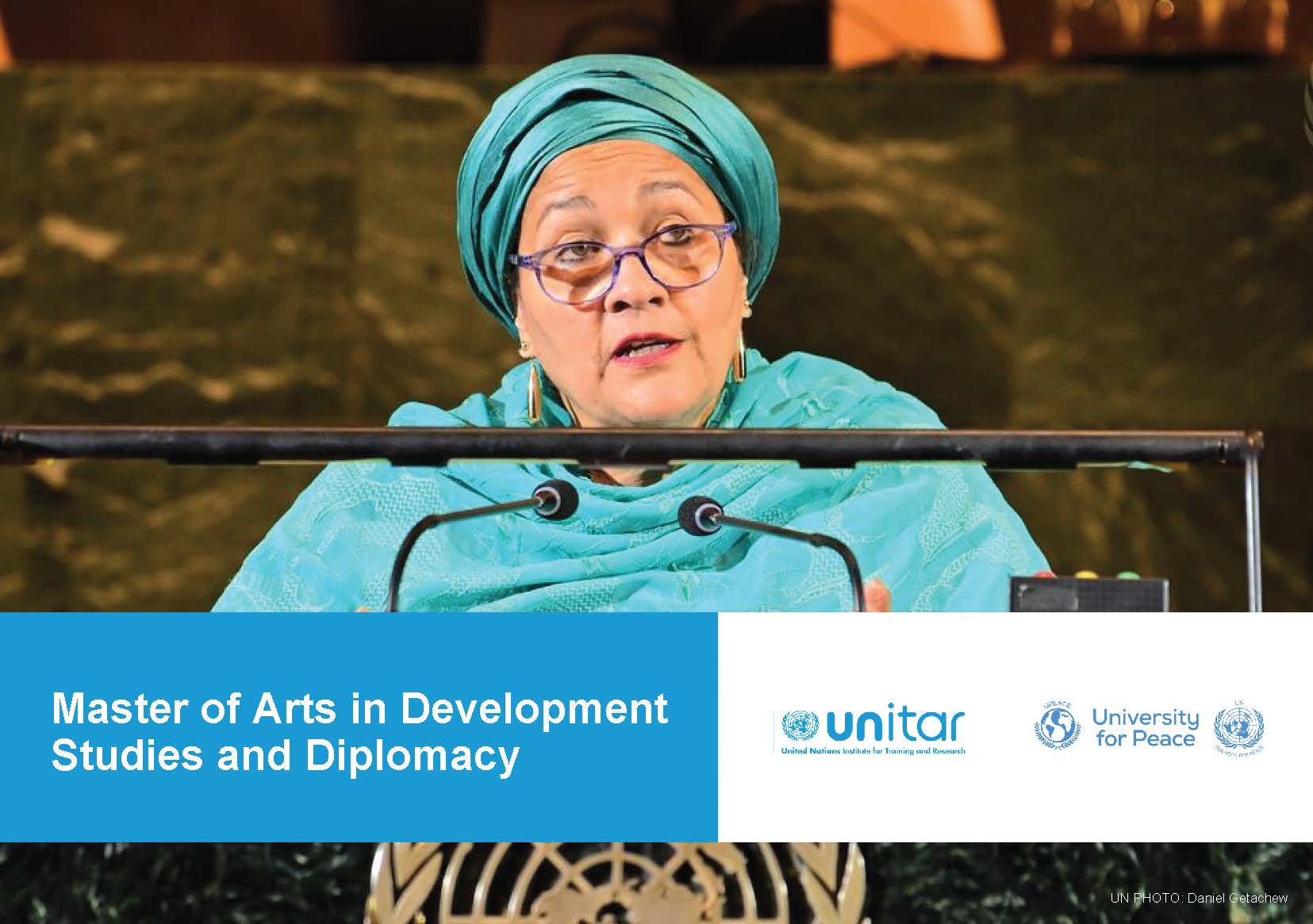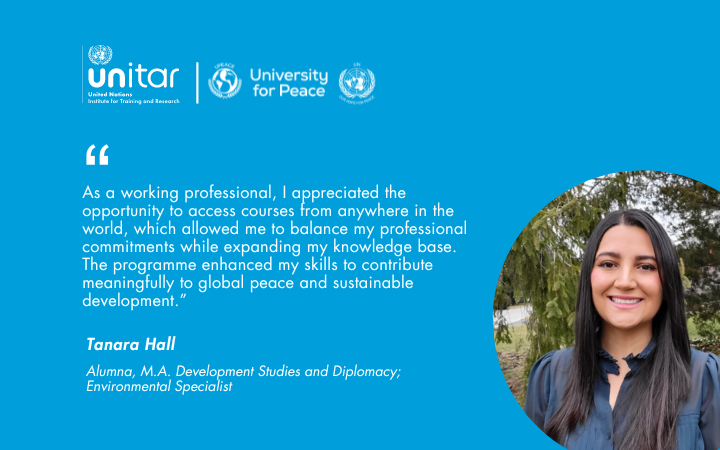M.A. in Development Studies and Diplomacy (UPEACE-UNITAR)
Master of Arts in Development Studies and Diplomacy
Format: Online
Programme Start Online: 7 September 2026
Application Deadline Online: 30 August 2026
Programme Overview
The Master of Arts in Development Studies and Diplomacy (online), offered by UPEACE in partnership with the United Nations Institute for Training and Research (UNITAR), is an interdisciplinary and holistic programme that will broaden student’s knowledge in the field of development studies, sustainability, and diplomacy, and equip them with the required soft skills for a successful international career in any of these areas of expertise.
Offered in an Online Format, students in this programme will analyze the different dimensions of development, including environmental, social, economic, and human dimensions, as well as the theory and practice of diplomacy in the 21st century.
Students will also attend skills development sessions and coaching sessions that are designed to support their professional careers and employability. Careers in this field can be very broad, with prospective employers including governments, international organizations, development agencies, academia, and the private sector.
Students will have an opportunity to participate in an optional field visit to Geneva (Switzerland) and/or The Hague (Netherlands), immersing themselves in the heart of diplomacy and international law.
Click on the image below to see the full programme brochure.
Programme Information
Programme Modules
The Master of Arts in Development Studies and Diplomacy will be implemented online on UPEACE’s Virtual Learning Environment in an asynchronous manner.
Course List:
- Development Studies and International Cooperation (UPEACE)
- Peace and Conflict Studies; The Foundation Course (UPEACE)
- Sustainable Development Theory, Policies and Practice (UPEACE)
- Transformative Education in Precarious Times: Educational and Pedagogical Possibilities (UPEACE)*
- Migration and its link to Peace, Security, and Sustainable Development Agenda (UPEACE)*
- Food Security (UPEACE)*
- Research Methodology (UPEACE)
- Sustainable Development Goals (UPEACE)
- Global Governance (UPEACE)
- International Law, Borders and Conflicts (UPEACE)*
- Workshop on Negotiation and Mediation Skills (UPEACE)*
- Gender and Peacebuilding (UPEACE)*
- Introduction to the United Nations System (UNITAR)
- Climate Adaptation and Justice (UPEACE)*
- World Politics (UPEACE)
- Conflict Analysis (UPEACE)*
- Globalization and Human Rights (UPEACE)*
- Environment, Development, and Peace (UPEACE)*
- Conflict Resolution and Crisis Management (UNITAR)
- Human Rights, Internet and Sustainable Development (UPEACE)*
- Diplomacy in the 21st Century (UNITAR)
- Fundraising for Sustainable Development (UPEACE)*
- Independent Research Project (UPEACE)
* Optional courses
Online M.A. in Development Studies and Diplomacy Calendar (2026-2028): click here.
Field Visits
Students admitted to the programme are offered a unique opportunity to partake in an optional field visit to Geneva, Switzerland, and/or The Hague, Netherlands, immersing themselves in the heart of diplomacy and international law.
The five-day field trip(s) cost USD 1,500 each and include exclusive experiences such as visiting various international organizations, the ICRC museum in Geneva, the ICJ in The Hague, and engaging in networking sessions with diplomats, personnel from permanent missions accredited to the UN, civil servants working in international organizations, and representatives from civil society.
Scheduled for the summer, the confirmed dates for these optional field visits will be shared with interested students by UPEACE and UNITAR well in advance. Students have the flexibility to enrol in either the Geneva or The Hague visit individually, or they can choose to participate in both field trips to maximize their learning experience.
(*) Please note that the fellowship programme does not include travel, accommodation, food, or visa expenses. Please note that students should have a valid health insurance plan in place during their stay in Switzerland and/or The Netherlands.
Required Documentation
The following documentation is required to complete your application process. Please have them ready and on hand before beginning your online application process, as they will need to be uploaded into the system.
- English Proficiency Test Scores Report: TOEFL (PBT, CBT or IBT), IELTS, Duolingo English Test, Pearson Test of English or Cambridge English Language Assessment
- Statement of Purpose
- Letters of Recommendation
- Official Undergraduate (Bachelor’s Degree) Transcripts and Degree Certificate
- Curriculum Vitae or Resume
- Copy of Passport (front page with photo only)
- One passport-size photo for ID purposes
The online application requires electronic (PDF) scans of required documents. Should admission be granted, the following documents will be eventually be required in official hard copy:
- English Proficiency Test Scores Report: TOEFL (PBT, CBT or IBT), IELTS, Duolingo English Test, Pearson Test of English or Cambridge English Language Assessment (if applicable)
- Official Undergraduate Transcripts and Degree Certificate (and English translations if applicable)
- Three (3) passport-size photos.
Costs
The cost for pursuing the Master of Arts in Development Studies and Diplomacy is USD 8,700. This includes tuition, administrative fees, and other associated costs. It is important to note that additional expenses, such as textbooks, accommodation, field visits, and living expenses, may not be covered in this figure.




